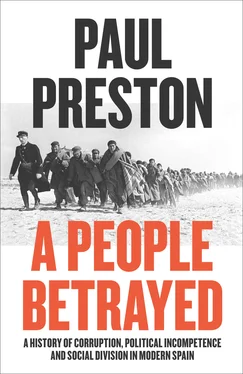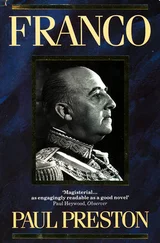1 ...7 8 9 11 12 13 ...18 The two parties thus lived within a non-aggression pact which made a mockery of the apparently democratic system because the formation of governments had nothing to do with the will of the electorate. Only after governments had been appointed by the King were elections held. The results were then carefully arranged by the party in power and produced, on average, 65 per cent majorities. Such apparently humiliating defeats for one side were rendered acceptable by the certainty of an equally spectacular victory next time. Between them the two dynastic parties held 98 per cent of parliamentary seats in 1884 and 83 per cent in 1901. The republicans and the Carlists had relatively little representation. The relatively even alternation was illustrated by the fact that, between 1879 and 1901, of all the deputies ‘elected’ 1,748 were Conservatives and 1,761 were Liberals.47 Electoral falsification ensured that the narrow interests represented by the system were never seriously threatened. The system rested on the social power of local town bosses or caciques . In the northern smallholding areas, the cacique could be a moneylender, one of the bigger landlords, a lawyer or even a priest, who held mortgages on the small farms. The threat of foreclosure could secure votes. In the areas of the great latifundio estates, New Castile, Extremadura or Andalusia, the cacique was usually the landowner or his agent, the man who decided who worked and therefore whose family did not starve. The cacique thus could acquire the votes of individuals by many means, ranging from the intimidation that came from ruthless control of the local labour market to the granting of favours and bribes.
Control of the local administrative and judicial apparatus enabled the cacique to provide favourable judgements in land disputes, jobs, reduction of tax bills or exemptions from military service for someone within the clientelist network. Each change of government would see a massive changeover of jobs from the most humble doormen and roadsweepers to civil governors, judges and senior civil servants, all of whom were expected to vote as instructed.48 After the elections of 1875 had been arranged by Cánovas’s Minister of the Interior, Francisco Romero Robledo, Sir Austen Henry Layard, the British Ambassador to Spain from 1869 to 1877, reported to the Foreign Office that virtually every salaried placeholder had been replaced by a supporter of Alfonso XII.49 There was no permanent civil service or judiciary owing its service to the nation. The system itself fostered corruption by ensuring that public service was for private benefit. Thus the tradition which endures to this day was established whereby few of those who become mayors ( alcaldes ) leave the town hall poorer than when they entered.
General Eduardo López de Ochoa wrote in 1930 that the majority of judges and magistrates owed their places to political intrigues and passed sentences in the interests of their patrons. The same applied right down to secretaries and court clerks. It was said of the great cacique Juan de la Cierva that no leaf fell in the province of Murcia without his permission. López de Ochoa claimed that La Cierva had several judges of the Supreme Court in his pocket and could always count on judgments favourable to himself or his friends. López Ochoa quoted a law professor who had stated that ‘larceny and robbery existed in Spain only in regard to amounts lower than one hundred thousand pesetas. Above that figure, they were called financial affairs.’ In any issue, civil or criminal, that went through the courts, a sum had to be put aside to grease the wheels of ‘justice’.50
Similar accusations to those made about Juan de la Cierva were made regarding numerous other powerful caciques who also controlled entire provinces: Álvaro de Figueroa y Torres, the Conde de Romanones in Guadalajara; the wheat baron Germán Gamazo in Valladolid; Juan Poveda and Antonio Torres Orduña in Alicante; Carlos O’Donnell, Duque de Tetuán, in Castellón; Pedro Rodríguez de la Borbolla in Seville; Manuel Burgos y Mazo in Huelva; Gabino Bugallal in Orense or Augusto González Besada in Lugo.51 With the tax collector, the alcalde and the judge at his command, the cacique was able to take over parcels of common lands, let his cattle graze on his neighbours’ lands, divert water away from the land of his enemies and towards his own or that of his friends and have works done on his property at the expense of the municipality. A landowning lawyer from Almería commented: ‘Four pickpockets in top hats and four thugs usually make up the top brass of a party.’ In a similar vein, the one-time Minister of Justice Pedro José Moreno Rodríguez claimed that ‘those that the Civil Guard used to pursue now work as bodyguards for the authorities’. It was a symptom of how openly the system worked that despite the press publishing the most corrosive accounts of caciquismo , the outrage of public opinion changed nothing. The general view was that the lower orders of the caciquismo system, the alcaldes and secretaries, had often spent time in prison and, if they had not, their liberty had been maintained through the influence of the caciques that controlled the local judiciary.52
At a provincial level, the cacique was a highly privileged middleman between the government and the local vote. The incoming Minister of the Interior chose the provincial civil governors and he squared the caciques .53 The influence that permitted the cacique to supply the required votes to the government depended in part on the distribution of patronage that was provided by the public purse. This might take the form of the rerouting of a road or railway or the building of a bridge that would extend his influence over a town or even an entire province. The loyalty of the cacique ’s clientele also depended on the protection of family and friends from the law, from taxation or from conscription. It has been calculated that the more than a third of the correspondence written by the principal politicians of the Restoration period consisted of requests for votes or letters of recommendation for those whose votes were required. Moreover, the bulk of such correspondence was written just before or just after elections. It is said that the homes of Sagasta and Cánovas in Madrid were besieged on a daily basis by aspirants for government jobs or favours such as public works in their district. So frequently were roads built for the convenience of local caciques that they came to be known as parliamentary highways.54
On occasion, over-zealous local officials would produce majorities comprising more than 100 per cent of the electorate. It was not unknown for results to be published before the elections took place. As the century wore on, after the introduction of universal male suffrage, casual falsification became ever more difficult and, if the requisite number of votes could not be mustered, the caciques sometimes registered the dead in the local cemetery as voters. In Madrid in 1896, fictitious voters, known as Lázaros, used the names of deceased electors. More frequently, they sent gangs of paid voters from village to village to vote for the government party. In 1879, Romero Robledo used the technique of ‘flying squads’ – 200 Aragonese raced around Madrid from polling station to polling station using their votes. It was said that one man had voted forty-two times. The alteration of the electoral list or the addition or subtraction of votes was known as pucherazo or tupinada , the packing of the pot. Sometimes, announcements were placed in the local press announcing, falsely, that a rival had withdrawn his candidacy. More common was to change the timing of elections so that hostile voters would not arrive in time or having thugs present to intimidate rival voters. At other times, the voting urns were placed where voters would not want to go, in a fever hospital, a pigsty or on a high roof. In 1891, in one voting station in Murcia, the supervisor obliged voters to pass their voting slips through a window so that he could change them at his convenience. Advantage could also be taken of some who simply did not bother to vote. If the vote was not going as planned, there were thugs on hand to raid the polling station and seize the voting urns. Sometimes, those likely to vote for the unofficial candidate would be thrown in jail or else threatened with investigation of their tax status. Most common of all was simply the falsification of the count.55
Читать дальше












